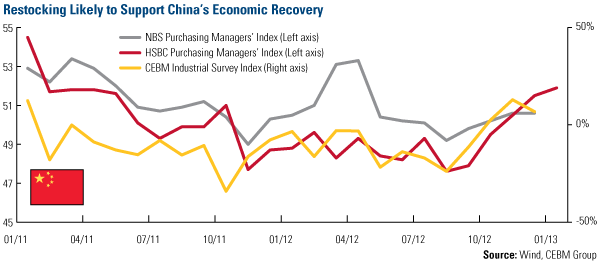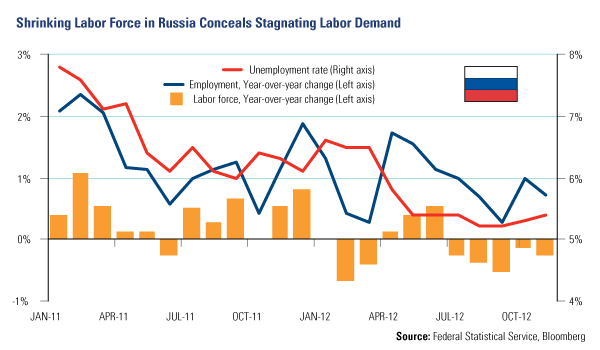Emerging Markets Radar (February 4, 2013)
Strengths
• The HSBC China January Final Manufacturing PMI was 52.3 versus 51.5 in December. The final reading was higher than HSBC's preliminary January PMI of 51.9, announced January 24. The new orders sub-index climbed to a two-year high of 53.7.
• Truck demand has been rising since October 2012 and dealers are fully de-stocked with inventory sometimes less than one month’s sales in January, Chinatruck.org reported.
• There is an 80 percent chance that A-shares will rally around Chinese New Year according to historical data, CICC reported.
• The Philippines GDP grew 6.8 percent in the fourth quarter, and was up 6.6 percent for 2012, boosted by private consumption and investment. CLSA has raised the Philippines GDP growth to 5.5 percent from previous 4.8 percent for 2013.
• Taiwan’s GDP growth was 3.4 percent for the fourth quarter, exceeding market expectation and improving from 1 percent in the third quarter. For 2012, Taiwan’s GDP growth was 1.3 percent, which is highly dependent on trade since domestic demand is soft.
• Hong Kong’s December retail sales value growth beat expectation and was up 8.8 percent. Jewelry, watches and clocks sales were up 9.3 percent due to money inflows from China.
• Korea’s January exports grew by 11.8 percent versus market expectation of 8.9 percent, after a 5.7 percent decline in December. Imports rose by 3.9 percent in January after falling 5.2 percent in December. Headline inflation in January was steady at 1.5 percent.
• Thailand inflation came in at 3.39 percent in January, versus market consensus of 3.5 percent.
• Unemployment has fallen to new or near-record lows in Brazil (4.6 per cent), Chile (6 per cent) and Colombia (10 per cent). No wonder domestic consumption is soaring: Got a job, will spend.
• Eastern Europe follows Germany’s green shoots: manufacturing PMI improved in January, particularly in Hungary where it surged to 55.9, a 10-month high.
• The internet has shown a flurry of attention to the ad campaign below from the Eastern Poland Economic Promotion Program. The kid could be right as Poland was named one of the best emerging markets in the world, according to Bloomberg Markets Magazine, with 21 percent GDP growth projected from 2013 to 2017.

Weaknesses
• The China official January PMI was 50.4, indicating the industrial activities are expanding. The reading was lower than 50.6 in December and market expectation of 5.09, due to slowing activities approaching and during the Chinese New Year holiday season. In spite of lower January PMI, the new orders sub-index in the official PMI inched up to a nine-month high of 51.6, which might be the driver behind the Shanghai A shares index’s’ overnight gain of 1.41 percent. The National Bureau of Statistics of China (NBS) said on Friday that it had expanded the sample size for the official PMI survey to 3,000 firms from the previous 820 across 31 industries in January, which makes month-over-month comparison difficult.
• Indonesia headline inflation edged up to 4.6 percent in January from 4.3 percent in December. This was largely due to heavy rains, which caused disruption of food distribution and crop failures.
• Turkey’s hopes for a second upgrade to an investment grade rating were dashed after Moody’s issued a statement leaving the sovereign rating unchanged.
• Colombia's peace talks are resuming in Cuba amid acrimony over the rebels' insistence on their right to take police officers prisoner, in a clear reference to last week's capture of two police officers. For years investors have been unable to exploit Colombia’s large-installed capacity due to the uncertainty surrounding the FARC.
Opportunities

• The chart above shows key leading indicators are moving in the same direction that points to restocking in China. CEBM, an economic research firm in China, also recently conducted an inventory survey among industrial sectors, and discovered inventories were low in general, which supports improving CPI numbers.
• With the right mix of policy measures, Indonesia could repeat Turkey’s hat trick--control currency appreciation, curb loan growth, and improve competitiveness of the export sectors. And, Indonesia’s macro challenges do not even look as stretched as Turkey’s were back in 2010-2011.
• The two-day summit of Latin American Community of States (CELAC) and the European Union last weekend ended with a final declaration that calls for guaranteeing legal certainty for investors and avoiding protectionism. "We have a good final declaration that spoke about the need to avoid protectionism and guarantee legal certainty for investment," said European Commission President Jose Manuel Barroso.
Threats
• Latin American policymakers are manning their defenses ahead of what could be a new battle in the "currency wars" as flows of hot money put unwelcome upward pressure on their currencies.
• Property prices rose 1 percent month-over-month in January due to developers’ optimism that the government didn’t further tighten the housing market in the last year, according to a Soufun.com report. This faster price increase can eventually invite tougher government policies in tightening the market.
• Continued decline of unemployment in Russia belies weakness in real wage growth. It is increasingly driven by shrinking labor force due to persistent demographic contraction of the working age population, rather than strong labor demand. This keeps unemployment down even despite labor demand and the broader economy being close to stagnation.













